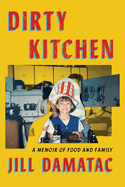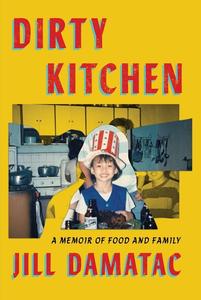
 In the Philippines, the outdoor "dirty kitchen" is where the heavy-duty cooking takes place, as opposed to the indoor show kitchen where the privileged keep Western-style appliances meant to impress guests. Dirty Kitchen is a perfect title for Jill Damatac's debut memoir, given the themes of deception and inequality that followed her traumatic path from the Philippines to 22 undocumented years in the U.S.
In the Philippines, the outdoor "dirty kitchen" is where the heavy-duty cooking takes place, as opposed to the indoor show kitchen where the privileged keep Western-style appliances meant to impress guests. Dirty Kitchen is a perfect title for Jill Damatac's debut memoir, given the themes of deception and inequality that followed her traumatic path from the Philippines to 22 undocumented years in the U.S.
In 1992, Damatac, then nine, flew from Manila to Newark, N.J., with her mother and sister to join her father, an Overseas Foreign Worker, required by Filipino law to send half his earnings home. Whereas in the Philippines they'd lived in a "big marble house" he designed, in the U.S. they shared one cramped room in a relative's home. Her father was trained as an architect but had to work at a gas station; her mother had more than 10 years' experience at the Philippine National Bank yet, initially, could find only bakery and grocery store jobs. A crooked lawyer took thousands of dollars from them but never produced the promised visas. That lack of paperwork limited the family's opportunities and access.
It can be emotionally challenging to read about the author's complex trauma. Damatac became a scapegoat for her father's anger over his frustrated ambitions. He beat her daily and demanded her earnings from part-time work. She felt she never merited his approval, even when studying for the National Spelling Bee. Things got worse before they got better: at age 19, she attempted suicide and was expelled from college. Dependence on extended family left her vulnerable; she was raped by an uncle. After years in dead-end jobs, marriage to a British man enabled her to obtain U.K. citizenship, earn advanced degrees in creative writing and documentary film, and legally re-enter the U.S.
Damatac is understandably angry about the lie of the American Dream: hard work was no guarantee of success for her family. She also decries American imperialism in the Philippines, deftly incorporating the history of this multiply colonized country. Food becomes her primary way of reconnecting with her Indigenous culture. Filipino legends and recipes arise throughout the memoir, with each chapter named after a different dish she cooks. Pinikpikan (chicken stew) was traditionally made to appease the gods; Spamsilog (fried rice with canned pork) reflects American GIs' influence.
Though harrowing at times, this memoir is recommended to readers of Elaine Castillo, Stephanie Foo, Qian Julie Wang, and Tara Westover. It showcases the survival of the spirit and the sustaining power of heritage. --Rebecca Foster, freelance reviewer, proofreader and blogger at Bookish Beck
Shelf Talker: Jill Damatac's forthright foodoir calls out injustices: not just personal trauma, but the colonization of the Philippines and U.S. immigration policies that kept her undocumented for 22 years.

